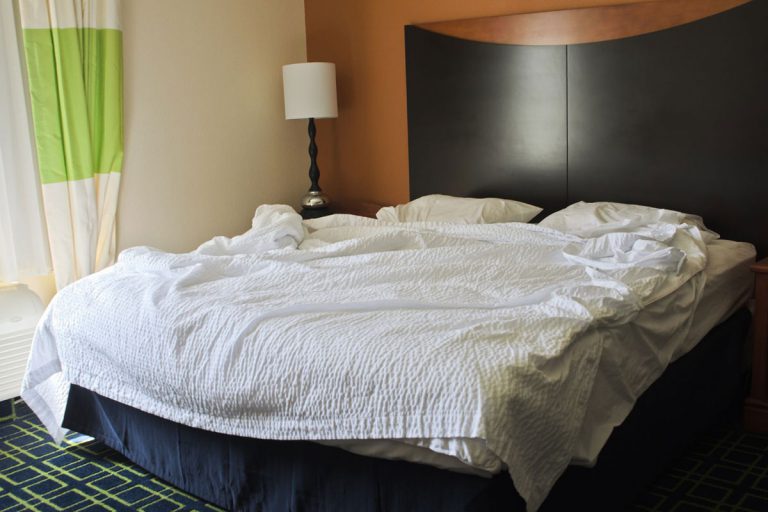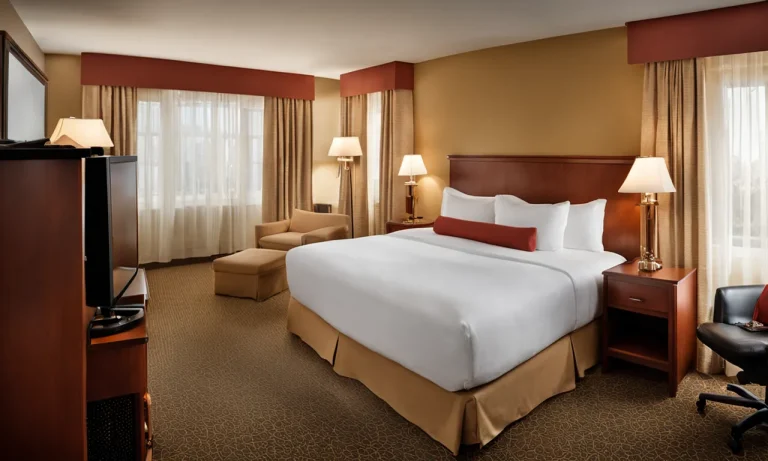When booking a stay at a Hilton hotel, you may see a pending charge on your account over and above the room rate. This is an authorization hold that Hilton places to cover incidentals and ensure you have adequate funds for your stay.
If you want the quick answer, Hilton hotels typically place a hold of $50 to $150 per night, but can vary by property.
In this comprehensive guide, we’ll explain what Hilton credit card authorizations are, why the pending charges are higher than your room rate, how much Hilton holds for incidentals, how long the hold lasts after checkout, tips for avoiding large authorizations, and how to get Hilton to remove the hold.
What Are Hilton Credit Card Authorizations?
When you book a stay at a Hilton hotel, you may notice a temporary hold on your credit card called a credit card authorization.
These authorizations are a common practice in the hotel industry and serve as a way for hotels to ensure that guests have enough funds to cover their expenses during their stay.

Temporary pending charges to cover your room rate, taxes and estimated incidental expenses
During the check-in process, Hilton hotels will place a temporary hold on your credit card for the amount of your room rate, taxes, and estimated incidental expenses.
This authorization ensures that the hotel has access to funds to cover these costs if necessary. The amount of the hold will vary depending on the length of your stay and the hotel’s policies.
It’s important to note that this hold is not an actual charge on your credit card. Instead, it temporarily makes those funds unavailable for other purchases until you check out. It’s similar to when you use a debit card at a gas station and a hold is placed on your account until the final purchase amount is determined.
Not actual charges, just makes funds unavailable until check out
While the authorization may appear as a charge on your credit card statement, it is simply a temporary hold and not an actual charge.
This means that you have not been billed for these expenses yet, and the funds will not be withdrawn from your account unless you incur additional charges during your stay.
It’s important to keep in mind that these authorizations are standard practice in the hotel industry and are in place to protect both the hotel and the guest.
By temporarily holding funds, the hotel ensures that guests have the means to cover their expenses, while guests have the peace of mind knowing that their room and incidentals are taken care of.
Drops off account shortly after checkout, but can take a few days
Once you check out of the Hilton hotel, the authorization hold will be released, and the funds will become available in your account again.
However, it’s important to note that it can take a few days for the hold to drop off your account, depending on your bank’s processing time. This is a common practice among hotels and not specific to Hilton.
If you notice that the hold has not been released after a few days, it’s always a good idea to contact your bank or credit card issuer for further assistance. They will be able to provide you with more information about the hold and help resolve any issues that may arise.
Why Are Hilton Holds More Than the Room Rate?
When you book a stay at a Hilton hotel, you may notice that a higher amount is being held on your credit card than the advertised room rate. This additional hold can sometimes be confusing for guests, but there are valid reasons behind it.
Covers estimate for incidentals like room service, minibar, movies
One of the main reasons Hilton hotels place a hold on your credit card that exceeds the room rate is to cover potential charges for incidentals. Incidentals can include expenses such as room service, minibar purchases, or pay-per-view movies.
By placing a hold for an estimated amount, Hilton ensures that guests have enough funds available to cover these additional charges during their stay.
This practice is common in the hotel industry as it provides a convenient way for guests to enjoy services without having to pay for them individually. It eliminates the need for you to constantly authorize every charge you make during your stay, making your experience more seamless and enjoyable.

Holds ensure guests have adequate funds for the entire stay
Another reason for the higher hold amount is to ensure that guests have sufficient funds to cover the entire duration of their stay.
Hilton hotels typically hold the full amount for the entire reservation, including taxes and fees, to guarantee that guests can pay for their stay in its entirety. This is especially important for guests who may have a longer stay or plan to use additional services throughout their visit.
By holding the full amount upfront, Hilton minimizes the risk of guests checking out without paying for their entire stay. This allows the hotel to provide a high level of service and maintain its reputation for excellence in the hospitality industry.
Protection for Hilton in case of unpaid incidental charges
Lastly, the higher hold amount serves as a form of protection for Hilton in case guests do not settle any incidental charges upon check-out. In the event that a guest leaves without paying for room service or other additional services, Hilton can use the funds held on the credit card to cover these unpaid charges.
This practice helps Hilton maintain its financial security and ensures that all guests contribute to the cost of the services they receive. By holding a higher amount initially, Hilton can minimize the risk of unpaid charges and continue to provide exceptional service to all guests.
It’s important to note that any unused portion of the hold will be released back to your credit card after check-out. The exact timing of the release may vary depending on your bank’s policies, so it’s always a good idea to check with them if you have any concerns.
How Much Does Hilton Hold for Incidentals?
When staying at a Hilton hotel, you may wonder how much they hold on your credit card for incidentals. The amount that Hilton holds can vary depending on the hotel property, room type booked, and the location of the hotel.
Understanding these factors can help you plan your budget accordingly and avoid any surprises when it comes to your credit card charges.
$50 – $150 per night is typical at most properties
On average, Hilton hotels typically hold between $50 and $150 per night for incidentals. This amount is a temporary hold placed on your credit card to cover any additional charges you may incur during your stay, such as room service, spa services, or minibar purchases.
It’s important to note that this is not an additional charge, but simply a hold that is released when you check out and settle your final bill.
High-end hotels may hold up to $200 – $300 per night
For high-end Hilton hotels, such as luxury resorts or properties in popular tourist destinations, the incidental hold amount may be slightly higher.
In some cases, these hotels may hold between $200 and $300 per night. This is because these properties often offer more upscale amenities and services, which can come with a higher cost.

Varies by hotel location and room type booked
The amount that Hilton holds for incidentals can also vary based on the location of the hotel and the type of room you have booked.
For example, a Hilton hotel in a major city may have a higher incidental hold compared to a hotel in a smaller town. Similarly, a suite or upgraded room may have a higher hold amount compared to a standard room.
It’s always a good idea to contact the specific Hilton hotel you will be staying at or check their website for more information regarding their incidental hold policy. This can help you plan your budget and ensure that you have enough available credit on your card to cover any incidental charges that may occur during your stay.
How Long Do Hilton Holds Last?
When you stay at a Hilton hotel, it is common for them to place a hold on your credit card for incidentals.
This hold is to ensure that you have enough funds available to cover any additional charges that may occur during your stay. But how long do these holds last?
Usually 3-10 business days after checkout
Typically, Hilton holds on your credit card will last for a period of 3-10 business days after you check out. During this time, the hold will be reflected as a pending transaction on your credit card statement.
It’s important to note that the actual duration of the hold can vary depending on the policies of the specific Hilton property you stayed at.
Can take up to 14 days to disappear
In some cases, the hold may take up to 14 days to completely disappear from your credit card statement. This is because the release of the hold depends on various factors, such as the processing speed of your bank and the specific policies of Hilton.
It’s always a good idea to check with your bank if you notice that the hold is still showing up on your statement after the expected timeframe.
Banks process hold releases at different speeds
It’s important to keep in mind that different banks have different processing speeds when it comes to releasing holds on credit cards. While some banks may release the hold immediately after the 3-10 day period, others may take a bit longer.
Therefore, it’s always a good idea to contact your bank directly if you have any concerns or questions about the release of the hold on your credit card.
Tips to Avoid Large Hilton Holds
Pay with a debit card instead of credit card if concerned
If you’re worried about large holds on your credit card when staying at Hilton hotels, consider using a debit card instead. While credit cards are commonly used for hotel bookings, using a debit card can help you avoid potential holds on your credit limit.
By using a debit card, the hotel will typically only place a hold on the amount needed for the room and taxes, without any additional incidental charges. This way, you can have peace of mind knowing that your credit card limit won’t be tied up during your stay.

Inform agent at check-in you won’t use incidentals
Another way to prevent large holds on your credit card is by informing the front desk agent during check-in that you won’t be using any incidentals. Incidental charges often include expenses like room service, mini-bar purchases, or spa treatments.
By letting the hotel staff know in advance that you won’t be using these services, they may be able to waive or reduce the hold placed on your credit card. Communication is key, so don’t hesitate to clarify your intentions to the hotel staff.
Put down a cash deposit instead of allowing a hold
If you prefer to avoid any holds on your credit card altogether, you can opt to put down a cash deposit instead.
Many hotels offer this option as an alternative to credit card holds. By providing a cash deposit, you can cover any potential incidentals without tying up your credit.
Keep in mind that the amount of the deposit will vary depending on the hotel’s policies, so it’s best to inquire about this option before your stay.
Remember, it’s always a good idea to check the specific policies of the Hilton hotel you plan to stay at regarding credit card holds and deposits. Each hotel may have different procedures in place, so it’s important to be informed before making your reservation.
How to Get Hilton to Remove a Hold
Call hotel after checkout to request release
Once you have checked out of a Hilton hotel, it’s important to check your credit card statement for any holds or pending charges. If you notice a hold that has not been released, the first step is to call the hotel directly.
Explain the situation and kindly request that they release the hold on your credit card. In most cases, the hotel should be able to resolve the issue promptly and remove the hold.
If no release after 14 days, dispute with bank
If the hotel does not release the hold on your credit card after a reasonable period, such as 14 days, it may be necessary to take further action. In this case, contact your bank or credit card issuer and explain the situation.
They will guide you through the process of disputing the charge and potentially removing the hold from your card. It’s important to provide any necessary documentation, such as proof of payment or a receipt, to support your case.
Be patient, holds take some time to clear
It’s important to note that holds on credit cards can take some time to clear, even after you have checked out of a hotel. This is because the hotel needs to reconcile their records and ensure that all charges are accurate.
While it can be frustrating to see a hold on your credit card, especially if it is for a significant amount, it’s important to be patient and give the hotel and your bank time to resolve the issue. In most cases, the hold will be released within a reasonable timeframe.
Conclusion
In summary, Hilton hotels typically place a hold on your credit card for $50-$150 per night when you check in to cover additional incidental expenses during your stay.
While the hold may be inconvenient, Hilton uses authorizations to protect against unpaid charges.
The pending transaction will disappear shortly after you check out. Being aware of how Hilton authorizations work and planning accordingly can help avoid issues. If a hold remains longer than it should, follow up with Hilton or your bank to get it removed.






